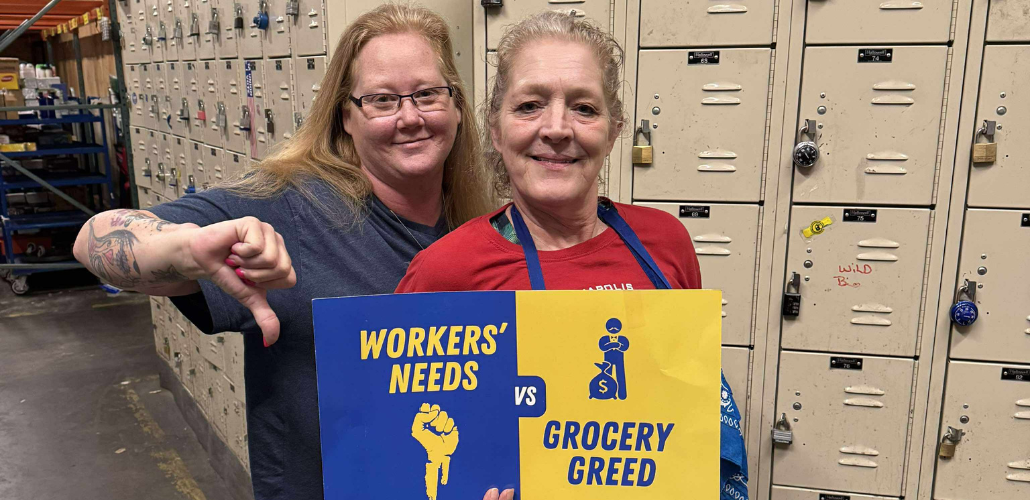SNAP Axe Could Fall on Grocery Shoppers and Workers Alike

About 70 percent of working-age SNAP recipients work full-time, and 1 in 10 working SNAP recipients work in grocery stores. These corporations are relying on the government to subsidize their low wages. Photo courtesy of Essential Workers for Democracy.
Beginning November 1, 42 million Americans who rely on the Supplemental Nutrition Assistance Program, more commonly known as “food stamps,” are set to go without benefits. Among them are union members in underpaid industries like grocery and retail.
SNAP keeps millions of Americans and their families from going hungry. Due to the government shutdown, new SNAP funding has not been allocated by Congress, and existing funding has run out. This would be the first time in the program’s 61-year history that SNAP benefits have not been paid.
For years Congress has appropriated a SNAP contingency fund to cover emergencies like a shutdown. UFCW Votes, the United Food and Commercial Workers’ political arm, has launched a petition calling for the release of these funds, something the AFL-CIO and 25 other unions are also calling for.
With the $6 billion fund, SNAP could remain fully funded for another month. But President Trump has refused to release the funds. A federal judge ruled today that he must. It is not yet clear whether the White House will comply or appeal.
MOST RECIPIENTS WORK FULL-TIME
Politicians aiming to cut benefits claim that those who rely on SNAP are unemployed. But UFCW members know it’s often them and their co-workers in grocery stores and meatpacking facilities who rely on these benefits.
About 70 percent of working-age SNAP recipients work full-time. Corporations get away with paying far less than a living wage, while workers rely on government assistance to survive. It’s a form of “corporate welfare.”
According to a 2020 study, about 1 in 10 of all working SNAP recipients in the United States work in grocery stores.
“Being in a rural part of Northern California, a lot of our community is dependent on SNAP benefits, including a lot of my co-workers,” said Eric Marcuz, a Safeway worker and member of UFCW Local 8. He estimates that about 1 in 5 of his co-workers rely on the program.
“A number of my co-workers are parents, and food for their family is supplemented with SNAP benefits,” said Caleb Stewart, a produce clerk at Ralphs in Los Angeles and member of UFCW Local 770. “Without that extra $100 at the end of the month, they won’t be able to get by.”
Grocery workers are concerned not only about how their co-workers will make ends meet without these benefits, but also about how a rise in theft and customer frustration might affect their stores. Already they’re facing an overwhelming crisis of understaffing.
‘IT’S A MANUFACTURED CRISIS’

SUPPORT LABOR NOTES
BECOME A MONTHLY DONOR
Give $10 a month or more and get our "Fight the Boss, Build the Union" T-shirt.
But members like Marcuz see this as a moment to build the union with solidarity, not shame. With benefit cuts looming, he and his co-workers have gotten together to organize food drive donation boxes in their break room for any Safeway employee to access.
“A lot of co-workers have been offering to volunteer to help coordinate,” Marcuz said, “but they’re also asking if it’s okay for them to take food.”
For other union members looking to organize a food drive, Marcuz’s advice is to start by identifying a workplace leader. “Everybody has a work ‘mom’ who’s already taking care of everybody,” he said. “Tap them in as the champion—they’re probably already doing some of that work anyways.”
Then all it takes is setting up a box and spreading the word to co-workers. “There’s a stigma that members would be embarrassed to take from the box,” he said, “so it’s important to emphasize that there’s no reason to feel shame when you’re a victim of corporate greed.”
UFCW members at Kroger in Indiana already have food pantries in their break rooms, a policy that members highlighted during their campaign earlier this year to reject subpar contract offers that failed to keep up with rising costs of living.
“In my conversations, I’m trying to focus on [how] the fact that working people can’t afford to eat is a problem of corporate greed,” Marcuz said. “It feels like it’s your fault, but it’s not your fault. It’s not anyone’s personal failure—it’s a manufactured crisis.”
“I’m reminding my co-workers that the enemy is not your fellow workers, it’s these corporations that pay us so low their workers require food assistance,” said Marcuz.
In Los Angeles, Stewart plans to speak to his local union leadership about working together to organize food drives for members. But at the end of the day, it comes down to inadequate pay in retail grocery.
“A majority of our money goes to rent, health care, things that should be covered by our employer or the federal government,” Stewart said. “If we had higher wages, people wouldn’t have to rely on SNAP as much.”
Caitlyn Clark is a national organizer at Essential Workers for Democracy (www.ew4d.org), an organization dedicated to rank and file member education and empowerment for workers in grocery, meatpacking, and retail.





![Eight people hold printed signs, many in the yellow/purple SEIU style: "AB 715 = genocide censorship." "Fight back my ass!" "Opposed AB 715: CFA, CFT, ACLU, CTA, CNA... [but not] SEIU." "SEIU CA: Selective + politically safe. Fight back!" "You can't be neutral on a moving train." "When we fight we win! When we're neutral we lose!" Big white signs with black & red letters: "AB 715 censors education on Palestine." "What's next? Censoring education on: Slavery, Queer/Ethnic Studies, Japanese Internment?"](https://www.labornotes.org/sites/default/files/styles/related_crop/public/main/blogposts/image%20%2818%29.png?itok=rd_RfGjf)